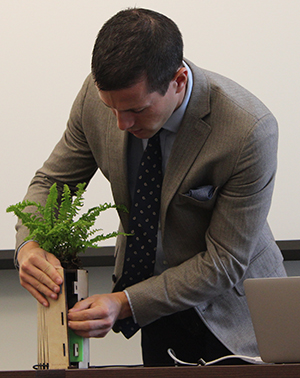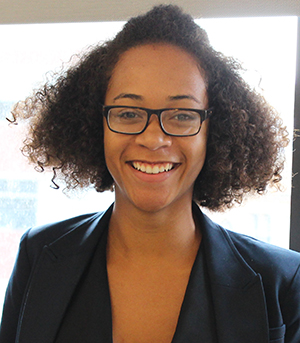Trio of Entrepreneurship Co-op Students Disrupt Business as Usual
For Benjamin Melman, Collin Cavote and Maria Allison, launching their ventures means more than just turning a profit. It means changing minds.
September 15, 2014
Coming up with an idea for a venture is easy. It’s actually growing that idea that makes you sweat. According to Benjamin Melman, Collin Cavote and Maria Allison — the Close School’s latest batch of Entrepreneurship Co-op students — sometimes the sweat lets you know your hard work is paying off.
After six months devoted to running their own ventures full time in the heart of the Baiada Institute’s incubator, Melman, Cavote and Allison earned their share of sweat equity — and some capital of the fiscal variety to boot.
Last week, the trio of entrepreneurs convened in the Baiada Institute to share their co-op stories with an audience of students, faculty and representatives from the Steinbright Center for Career Development.
Here’s what they had to say:
Booksmart
A Web and mobile application that changes the way musicians, agents and managers book shows.
Founder: Benjamin Melman
The Co-op: Benjamin Melman is practically a hardened music industry vet already. He’s been a concert promoter since high school. In fact, he books many of Drexel’s shows. But during an internship at the Agency Group in New York — a prominent talent-booking agency — he realized many tried and true booking practices were inefficient.
“I learned that basically a computer could do my job,” he says.
His answer was Booksmart, an app and website that allows for a more streamlined booking process. Melman used his six month co-op to develop the app and recruit beta testers. He’s even gotten buy-in from some of the biggest names in the music business, and has the contacts (and backstage passes) to show for it.
“I drew mock-ups on napkins and showed them to agents,” Melman says.
The app allows agents, managers and promoters to plan tours, sign contracts and manage all of the logistics that make tours possible.
Biggest Challenge: “Finding good mobile developers who would work for our company for no cash incentives,” Melman says. “It’s hard to build a technology company with limited funds, because developers are in extreme demand.”
Melman found a creative way around that by recruiting high school students to be on his development team. “They were all under the age of 16, and they were all geniuses,” he says.
What’s Next: Booksmart has received multiple investment offers, though Melman isn’t ready to give up control of his company thus yet. Melman is readying the app for a public launch next month.
 Biome
Biome
A biowall company devoted to using plants to manage climate change by scrubbing carbon from our air.
Founder: Collin Cavote
The Co-op: “I set out to build a biowall company. I wanted to build something to manage climate change,” Cavote says.
And that’s just what he did. Starting with the goal of using plant life to create cleaner air, Cavote used his co-op time to further focus his vision.
Biome was also selected as one of 50 companies to participate in Founder.org’s 2014 accelerator. One trip to Paris later, Cavote took home a $10,000 prize, which Biome used to pay a prototyping firm to create with a USB-powered desktop air purifier. While the response to that product has been positive, Cavote is positioning it as an accessory to the large-scale biowalls that Biome will create.
The company is now working on a Web interface that allows users to digitally build their biowall by selecting the material, plant and arrangements. Their constructions will include a way for plants to magnetically click into place. A computer will control water pumps, and a slow-release nutritional bath will nurture the plants behind the scenes.
“It's a smart machine. An appliance,” Cavote says.
Biggest Challenge: “When I started Launch It! [one of the Close School's most popular classes], I had a very vague idea and there have been many iterations of how we should enter the market. A big part of my co-op was figuring out where to situate ourselves in the marketplace,” he says. “I had to figure out what Biome wants to be when it grows up.”
Cavote eventually realized his product would be most viable among high-end commercial properties. He’s begun to concentrate his efforts on the commercial space, targeting architectural firms that can implement Biome products at the design stage.
“Our goal is to design with life,” he says. “We want to allow designers to make our spaces comfortable again.”
What’s Next: Cavote plans to use his senior year to focus on product design, attending conferences and networking. He’ll further hone the look, feel and functionality of Biome’s products, and make key industry connections.
 Forsei
Forsei
A socially conscious consulting firm that provides small businesses with the resources necessary to act on their good intentions.
Founders: Maria Allison and Nicole Koedyker
The Co-op: “It's been an amazing experience to work on Forsei for six months,” says Allison, the half of Forsei participating in the co-op (Koedyker graduated earlier this year). “This time has been invaluable.”
Forsei, which shows businesses how they can operate in a more efficient and responsible manner, was officially incorporated last October.
“We will comb through a business' operations, from governance to workers to facilities,” says Allison. “We help them figure out how to maximize their positive impact. And we use the B-Corp certification framework to do this.”
During Allison’s co-op period, Forsei worked with three clients to provide impact assessment assistance, gap analysis and program implementation. “These clients helped us to establish our own internal systems,” she says.
The company also engaged more than 100 people across 10 events over the past through a group they founded called the Philly Collective. The organization encourages the cross pollination of services and triple bottom line best practices among member businesses, recruits new B-Corps and educates the public on what it means to be socially and environmentally responsible.
Biggest Challenge: The lack of incentive for companies to become B-Corp certified in Philadelphia. San Francisco, for example, offers B-Corp certified companies more financial benefits.
“Philly is on its way, but they’re not quite there yet,” Allison says.
What’s Next: Allison will graduate from Drexel in December. Until then, she and Koedyker will continue to develop Forsei while Allison works part time in Drexel’s Office of Community Partnerships.